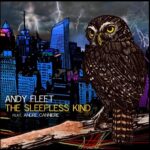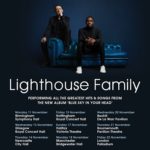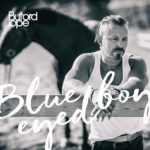 Andy Fleet isn’t the most prolific of album artists; his last album was in 2013. Which doesn’t really matter; his musical world is not ruled by release schedules, so why not release albums when you’re happy you’ve created something that people will want to listen to and appreciate. And I need to apologise here, this album has been out since March but somehow managed to avoid my attention until now and that’s my loss because “The Sleepless Kind” is a little gem of an album, the kind you want to listen to again and again. Even the cover is a nice piece of art by Alban Low inspired by the song ”Through Closed Eyes”.
Andy Fleet isn’t the most prolific of album artists; his last album was in 2013. Which doesn’t really matter; his musical world is not ruled by release schedules, so why not release albums when you’re happy you’ve created something that people will want to listen to and appreciate. And I need to apologise here, this album has been out since March but somehow managed to avoid my attention until now and that’s my loss because “The Sleepless Kind” is a little gem of an album, the kind you want to listen to again and again. Even the cover is a nice piece of art by Alban Low inspired by the song ”Through Closed Eyes”.
The title tells the story; the theme of the album is the night and particularly the musicians who try to scratch a living in those hours of darkness, and those who make the bleary-eyed commuter journey to a day job that enables them to play another night. “The Sleepless Kind” is a tribute to those people who make music because they love making music. Is there a better reason?
“The Sleepless Kind” (which tops and tails the album) is a dreamy instrumental that sounds like it should soundtrack a Raymond Chandler story: gentle piano and moody, muted trumpet of Andre Canniere combine to paint a picture of a jazz club in the early hours, when you stop worrying about the last train and start thinking about the first train.
The remaining seven songs demonstrate the wide variety of influences feeding into Andy Fleet’s unique style. The band is superb with the slower, more evocative songs but goes up through the gears really smoothly for the more uptempo songs , such as “Been There, Drunk That” and the rollicking seventies, horn-driven groove of “Love’s Enemy”, which tells the story of a collector in a style that hints at Al Stewart and maybe even Gerry Rafferty. “Stolen Years”, a John Lennon tribute, hints at Thunderclap Newman, but “The Hobbyist” and “Through Closed Eyes” are the absolute pivot of the album.
“The Hobbyist” is a powerful tribute to Andy’s friend, the late Iain Bull, opening with some Jackson Browne-like piano, while “Through Closed Eyes” opens with a with a fairly traditional jazz set-up of keys, bass, drums (with brushes, initially) and trumpet and spins out its groove for nearly eight gorgeous minutes, telling the story of the London night from the perspective of an owl, silently watching over the neon-lit streets.
Mainly jazz-orientated, “The Sleepless Kind” also hints at blues, rock, pop and soul. The musicianship is superb throughout, never over-played, and the songs are well-constructed and meaningful. The album oozes class and rewards close attention. One to listen to in the small hours with a single malt close at hand.
“The Sleepless Kind” is out now on Low Vinyl Records (LV1608).
And here’s a little video snippet for you:
 The things we do for love?
The things we do for love?
Almost, but not quite.
Mrs. J is extremely partial to the velvet vocals of the Lighthouses and even though I cannot pretend to be a diehard fan I know an airplay tune when I hear one. My musings at the end of my recent review of an Al Stewart gig where I briefly allowed myself to consider how much brass the aforementioned’s “Year of the Cat” has made me, personally, over the years shrinks into complete insignificance compared to the recorded output of these guys.
I’ll have made more out of these than The Beatles, The Stones and The Who put together, and then some, and it is, of course, mutual. The Lighthouses have, or had, that uncanny knack. You could programme them anywhere, anytime, as often as you like and nobody is ‘tuning out’.
And therein lies the reason for my disquiet and sense of apprehension upfront of tonight’s gig. I really WANT to like them. And in this sort of circumstance you either get affirmation or very real disappointment. I am very worried that the crystal recorded quality of these songs as finished productions won’t cut it, live, in a largish, seated and rather soul-less theatre.
Well, let’s see…..a very pleasant curry upfront certainly meant I was very much ‘in the mood’ as support act Georgie wandered onto the stage. She’s a local lass, apparently, and this is the first night on the tour she can sleep in her own bed, she tells us. A solo singer/songwriter and tidy guitar/keyboard player, she does her stuff to an audience who are somewhere between polite and appreciative. She’s got a couple of decent songs, as well, which she wisely saves for late on in her set. Vocally, a bit like Sandy Thom meets k.d. lang in Nottingham. Excellent pitch, but there’s a lot of her about. Needs a ‘killer’ tune to break out and so far I don’t hear one, pleasant enough a listen though she is.
To The Lighthouse. Well, not exactly, yet and we’re given a time-consuming photograph backdrop ‘scene set’ to a sort of audio ‘drone’ which for me outstays a welcome by some considerable time. On they come, finally and serve up “Salvation”, a new one, as a set opener and it is your classic set opener, nothing more, nothing less, but the sound is muddy and Tunde Baiyewu’s vocals are struggling to be heard. This is followed by a mid-paced chugger with tidy Stevie Wonderesque keyboard tricks from Paul Tucker on “Blue Sky In Your Head”.
An early pearl is the gorgeous “Loving Every Minute” which is severely compromised by the backing singer just seeming ‘off’ somehow, Didn’t sound right to me, but let’s stay with the programme……
I’m sure the Lighthouses mean to be sincere on the inter-song raps, but they do really overcook it at times, with stories of raising kids and all that. So much so that the lead up to ”Put My Heart on You” doesn’t exactly have the desired effect on me.
By now, I will admit to feeling mildly irritated rather than entertained so when they kick into “Lifted” with the instantly recognisable Spanish guitar figure at the start, it is something of a relief. ‘I know what you’ve come for’, says the singer and he’s right, because as the night passes it becomes clear to me that these guys had excellent A and R and record company support. They absolutely picked the best songs as singles. Sadly, though, the hits do scream ‘HHIIIIITTTT!!’ at you extremely loudly so I don’t think it was a difficult job for the A and R bod to go ‘That’s the single’. And it isn’t just familiarity.
“Lifted” is a full-on radio singalong tune any day of the week. Nobody switches this off, ever. It does, indeed, ‘Lift’, and, to be fair, the audience are up on their feet for the first time. BUT – and unfortunately…….it doesn’t seem to ‘work’ live. I mean yes, everybody is up etc etc. but……in the cruel lights of the Concert Hall, the song is exposed for the one-line hook it pretty much is. The ‘trucker’s gear change’, the little ‘breakdowns’ in the song, all beautifully locked in by the studio with all the trickery a decent producer can bring to bear, are laid bare by the live performance. It’s just a bloke walking around the stage bleating one word, pretty much repeatedly. And “Run”, which follows, is breathtakingly ordinary.
“Raincloud” is a great song, though, and always was a bit of a fave of mine for coming out of an ad break with. You don’t have to say anything, the powerful piano shapes along with slightly eccentric percussion tricks, a bit off the beat, just draw you in and the chorus, combined with the Gil Scott-Heron style instrumental break are a delight.
Which is a shame, really as we lose the piano figure and the subtlety in percussion in the swirling, slightly mad, pseudo-Gothicky mix the whole thing seems to be wrapped in.
“Ocean Drive” is a really transcendental summer radio tune. About as close to a British Brian Wilson moment as you’re going to get, this one is pure escapist fantasy. We all know life isn’t like this but for two and a half minutes or so, most of us are prepared to suspend disbelief; and they do pretty much nail this. And “Lost In Space” is similarly such a plaintive radio-friendly tune; but tonight there just isn’t enough ‘Space’ for Tundi Baiyewu’s voice to touch and warm the listener; it is just squeezed too much by everything else that’s going on. And despite the warm accolades for the rhythm section from the two main Lighthouses, I thought they were that unforgiveable sin for a rhythm section; they were obtrusive, often as a deep, vibrating rumble, all sound and fury, signifying nothing. And completely at odds with the delicacy and lightness of the songs themselves.
“Who Gonna Save Me Now… by now, I am starting to feel uncomfortable. Another ‘ordinary’ tune, as is “Clouds”, but of course they have a set saver in “High”, which has graced many a person’s wedding/funeral/fave playlist, etc, etc and really you can’t go wrong with it…but once again, in a live format, those ‘trucker’s gear changes’ really do grate.
They encore with “Street Lights in the Rain” and “Free” and “One” but by now I have lost all patience with them. They are falling over themselves to congratulate the audience on their good taste, especially Paul Tucker, who is nobody’s idea of Mr. Showbiz and really, is best just not saying anything.
So, by the time we stream out onto the pavement, I am at serious odds with most of the audience. They feel ‘Lifted’, I feel like I’ve been resprayed magnolia. And my worst fears are confirmed. Clever though some of the songs are as studio confections, they do not translate that well into a live setting. The songs that were hits were hits for a reason. And their medium is FM (and, no doubt, digital) radio. They are best heard once every six hours or so…..or you do start to feel slightly….magnolia.
But the audience loved them, and the body of work is there, and we have done each other a lot of good over the years, so I’m going as far as 3 stars. But I don’t feel good about it.
 Well, I’ll say this for him, he’s in good nick for 74. Then again, he has looked after himself.
Well, I’ll say this for him, he’s in good nick for 74. Then again, he has looked after himself.
Al Stewart played the first Glastonbury. He knew Yoko Ono before John Lennon. Paul Simon was his next door neighbour and he’s exchanged songwriting notes with Leonard Cohen. Born in Glasgow, raised in Dorset, went to London to seek his fortune and settled in LA when it all ‘worked out.’
He’s a strange hybrid, really. A product of the BritFolk boom of the late sixties following the obligatory dalliance with British Beat groups in the early sixties, he, almost accidentally, once he’d come out of contract with his first major record company, morphed into a ‘staple’ of American FM radio, a classic of the ‘yacht rock’ genre. His vocals lend quite a lot to the Graham Nash ‘razorthroat’ school of glass-shattering clarity and he wrote songs. Lots of them. And one of them, finally and irrevocably, cracked America – and indeed the world – wide open for him.
This tour is with Chicago’s Empty Pockets, acting as opener for the man himself and also as his ‘Band’. As an act in themselves they’re a pleasant listen, a bit soppy maybe for a cynical old BritBloke and despite some excellent electric piano and some guitar to relish, not entirely convinced about the male/female harmonies which seemed a little harsh at times.
However, as the ‘Al Stewart Band’, in effect, they proved to be just the ticket, a perfect compliment and support to one of Britain’s greatest living ‘Heritage’ songwriters.
An unmemorable first tune – disarmingly ‘fessed up’ to as such by Stewart who claimed nobody’s interested in the first tune anyway; they’re too busy seeing if you’ve got any hair left etc – soon gave way to a sumptuous “Flying Sorcery” which is a beautifully fresh, naïve-sounding song which just picks the listener up and sweeps them off. And straight away it’s pretty clear this won’t be a hair shirt fest – it’ll be a celebration of those radio-friendly specials which were beautifully produced and are just sumptuous.
This kicked straight into “Time Passages”; album title track and Billboard top ten hit single. Refreshing as an upland winter walk it was a gorgeous listen live with fabulous sax solos – which this song MUST have to work – and thick layers of wrap – around keyboards, this brought the house down, even this early in the set.
It isn’t all good news, though. This is the 20th gig of a 21-date UK tour. A big ask for a bloke in his mid-seventies and a band from Chicago who by their own admission were feeling seriously homesick. Not sure if this was the reason – or if age had just caught up with the vocal chords and squashed his range so he can’t quite reach those stratospheric upper octaves, I don’t know – but, and to an extent to his credit, he didn’t rely on the younger harmonies to cut in to sustain and ‘replace’ his voice, he just put his own voice out there and although on occasion this meant slightly strange harmonic arrangements to get through some songs, I didn’t spend the night cringing for him.
An early high point was “On The Border”, reached number 42 on Billboard and the ‘breakers’ in the UK (I’ve still got the demo 45 vinyl) with the spine-rattling bass intro and fiery Spanish guitar and as a listener you’re reminded of how timeless and relevant many of these songs still are. Somehow a song about the Spanish civil war throws light on Brexit (‘in the islands where I grew up nothing seems the same’, anyone?) Or Syria. Pick and mix your own analogy. A rich and fulfilling listen, by now he has the audience eating out of his hand, a relationship which he then cemented by responding to a holler from the audience for “Brooklyn”, an ‘old one’ from more folky times, which could only be played by himself and one band member as no-one else knew the song! Now there’s spontaneity…..
“Broadway Hotel” was the B-side of the UK “Year of the Cat” single and here the keyboards ‘roll’ beautifully. It’s just a great song about a sort of ‘accidental’ seduction.
“Almost Lucy” follows, another irresistible song from “Time Passages” which references in terms of content if not style, the early folk club days. By now I am truly in awe at how well this stuff is translating onto stage; but why should this be? He’s just played over 100 US and 20 UK gigs with this band, this body of work (with variations!) – you’d expect an experienced trouper like Stewart to nail this – and he does just that. Otherwise, and at the age of 74, why do this to yourself?
I always think it is asking for trouble, playing human jukebox to audience shouts, but he seems quite at home with this form of Russian Roulette, even when some Muppet yells out “Year of the Cat” (like, he’s really not going to play THAT one, right?) and settles on “Clifton in the Rain” which really is folky, whimsical stuff going back to the sixties. Bit twee for me, but, if that’s what floats your boat…..which segues into the vignette poem “Small Fruit Song” for a few seconds prior to the audience applauding warmly, as they had more or less all night. He really is Going Down Well.
The track before “Year of the Cat” on said album is “One Stage Before” and that’s the order they are dealt tonight. The latter is a troubadour song; the way an audience is seen by an artist – and it isn’t always as a bunch of woolly sweater wearers eating ice cream tubs, as it turns out. And it’s another great song, spiced up by some great guitar and keyboard work by the Empty Pockets.
Prior to the captivating keyboard intro to the main event, (otherwise known as the greatest FM airplay tune of all time and no, I am not exaggerating) Stewart tells us the story of “Year of the Cat”. Along with various English folkies and ex-folkies who had some success, (Steeleye Span, Incredible String Band, Insert Name Here), he’d been shipped out to the US and hadn’t gotten very far, as tended to be the way. And then he found himself opening for Linda Ronstadt, which was a great opportunity. It worked fine in the more liberal North and West, but they hated him with a vengeance in the southern states, where an eight-minute song about the Russians, introduced as a ‘Country and Eastern song’ very nearly got him killed. So he went off to invent something which might have a broader appeal…and found one of the band members messing about with a particular progression….which they then chucked just one note into, and then he wrote some enigmatic, seductive, shape-shifting lyrics…and after a whole lot of work by producer Alan Parsons, he came up with and again I say it the single best FM radio playlister, ever. Got to number five on Billboard, even got to number 31 in tone-deaf Britain where we were still transitioning from glam to punk, and it wasn’t a good look…and it eventually drove the album, and the follow-up album, platinum. Slow burner, but now almost every UK radio station playing AOR love songs will now feature this as a staple alongside Billy Paul’s “Me and Mrs Jones” and Fat Larry’s Band and “Zoom”. Serving Suggestion. His conclusion (elsewhere) that he’d decided once he’d heard the final mix that if this wasn’t a hit, he couldn’t write a hit, proved very astute and possessed of an understanding of self which most musicians don’t seem to value.
Any slight misgivings about the slight lack of flexibility and range in the vocals are quickly disarmed by the ferocity and style of the guitar solo, the fluidity and drama of the main sax break, and the percussive but wandering piano fills and frills. It isn’t perfect, you’d need a whole bunch of strings for that and a voice that hadn’t been lived-in for quite so long but on balance this was one of my favourite five musical minutes of the year so far.
Difficult to know how you’d ‘ace’ that for an encore but “If It Doesn’t Come Naturally, Leave It” (also from “Year of the Cat”) sounded like a fair call – described by Stewart as a ‘sort of Bruce Springsteen pastiche’ and being played like that tonight, it did the job well, especially when followed as a parting shot by a newish tune about growing old; ‘Getting out of the box that you made of your life….you’re young again!’ I’ll drink to that.
It’s fair to say the lad’s come a long way from Bournemouth. Soon after “Year of the Cat” broke out, he moved to LA to live – and stayed there. Cue the sneers? Well, you would, wouldn’t you? Al Stewart; well-travelled, intelligent, articulate and with a great sense of historical and artistic perspective, this elderly troubadour reaches parts other singer-songwriters can’t reach.
And thanks for “Year of the Cat”. You made me a lot of money playing a beautiful song to a lot of people a lot of times. And the wonder is, it never felt like it.
 I don’t know why the idea of Scandinavian Americana should have seemed so strange at first; significant numbers of Scandinavians emigrated to the USA in the nineteenth century and it’s reasonable to assume that they brought their own flavours to America’s rich musical stew and that there would still be a cultural connection. Turns out that Americana is big in that part of northern Europe, both in homegrown and imported flavours, and that’s where Buford Pope (real name Mikael Liljeborg) comes in. Although he references Dylan as a touchstone, it’s difficult not to draw comparisons with Neil Young (particularly the Stray Gators phase) because of the high, keening voice and the plaintive pedal steel licks that permeate the album.
I don’t know why the idea of Scandinavian Americana should have seemed so strange at first; significant numbers of Scandinavians emigrated to the USA in the nineteenth century and it’s reasonable to assume that they brought their own flavours to America’s rich musical stew and that there would still be a cultural connection. Turns out that Americana is big in that part of northern Europe, both in homegrown and imported flavours, and that’s where Buford Pope (real name Mikael Liljeborg) comes in. Although he references Dylan as a touchstone, it’s difficult not to draw comparisons with Neil Young (particularly the Stray Gators phase) because of the high, keening voice and the plaintive pedal steel licks that permeate the album.
For his seventh album Buford Pope has opted for the naturalistic approach; learn the songs, get the right technical set-up and go in and play them once. And it works, although the album’s opening song “Still Got Dreams” is a bit too lo-fi for my taste. The lyrics deal with familiar roots themes: guns, drinking, driving (sometimes both at the same time) and families all feature in the mix. The recording process gives the album an intimacy and immediacy that recording tracks separately can never quite capture and highlights the interplay between the instruments, particularly the combination of slide or pedal steel and piano on “Infirmary” and “No Man’s Land”.
Standout songs? Well, the big chorus of “Freewheeling” and the epic Al Stewart feel of “The Baltic Sea” certainly do it for me.
“Blue-Eyed Boy” is released on Friday September 22 on Unchained Records (BP2017).


